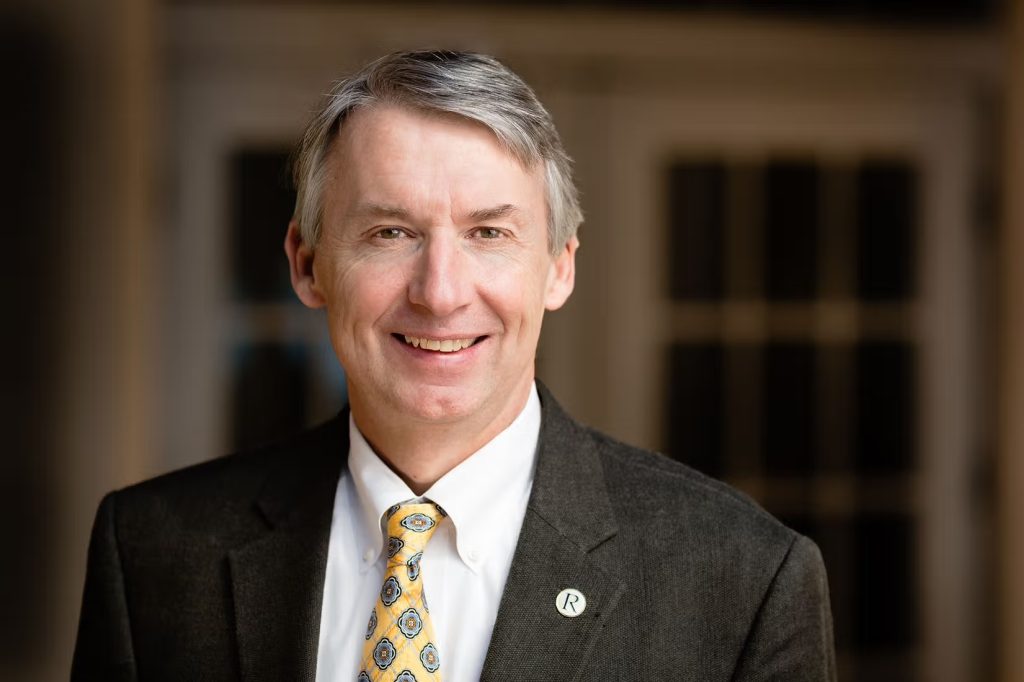
To be a Rollins student is more than knowing that one spring morning class will be canceled because it’s simply too nice outside—a day better spent at the beach than in a classroom. To be a Rollins student is more than walks to class lined with Mediterranean architecture in shades of pale manila and golden yellow. At the core of the Rollins experience is the support that comes from being surrounded by a small tight-knit community. For the past ten years, being part of that community has meant recognizing the blue Vespa that winds its way through the cobblestone paths of campus—and, more importantly, knowing exactly who’s riding it.
That signature blue Vespa belongs to Grant Cornwell, the college’s 15th president. Previously president of the College of Wooster in Wooster, Ohio, Cornwell began his presidency at Rollins College on Jul. 1, 2015. Under his leadership, the college has expanded student housing with the development of Lakeside Neighborhood in 2019 and the ongoing construction of The East-End Neighborhood, set to open in Fall 2026. Additionally, his tenure oversaw the expansion of the Alfond Inn in 2022 and the development of Kathleen W. Rollins Hall in 2020.
Beyond infrastructure, Cornwell’s presidency marked significant academic and cultural advancements, including the establishment of Rollins’ Phi Beta Kappa chapter, the implementation of Diversity, Equity, Inclusion, and Belonging initiatives, and the launch of Rollins Gateway, the college’s signature approach to liberal arts education.
Cornwell’s commitment to liberal arts education began with his own college experience, where he double majored in philosophy and biology at St. Lawrence University in New York.
“It’s a real liberal arts story,” said Cornwell, reflecting on his academic journey. “I wanted to be a doctor because my mom told me I did,” he admitted, but as he explored different disciplines, he realized that philosophy posed the questions that truly fascinated him.
The idea of sampling curriculum, savoring aspects of diverse academic disciplines like music, religion, art, science, and math, is central to the liberal arts experience. Advocating for this holistic approach has been a foundational aspect of Cornwell’s presidency. He co-authored “An Education for the Twenty-First Century: Stewardship of the Global Commons,” published in AAC&U’s Liberal Education among other academic works. His influence extends beyond Rollins as a past member of the board of directors of the National Association of Independent Colleges and Universities (NAICU) and former chair of the Association of American Colleges and Universities’ (AAC&U) Presidents’ Trust. He has also served on the boards of AAC&U and Teach for America as well as on the Council on Foreign Relations’ Global Literacy Advisory Board.
For Cornwell, the value of a liberal arts education transcends obtaining a degree or job training; it fosters a lifelong pursuit of knowledge and personal growth. He described it as “the cultivation of humanity.” By engaging with multiple disciplines and perspectives, students are encouraged to challenge their own beliefs and biases rather than reduce college to vocational preparation.
The liberal arts emphasize “skill development, knowledge acquisition, and personal cultivation,” said Cornwell, a philosophy that underscores the deeper purpose of education.
In the current political climate, education is under intense scrutiny, with efforts to eliminate DEI initiatives and proposals to dissolve the Department of Education. Cornwell believes that advocating for the power and instrumental value of a liberal arts education is more critical than ever.
“Students should be public intellectuals,” he said, urging them to demonstrate how liberal arts education has shaped their professional, academic, and personal growth and to continue advocating for its significance.
Another essential part of the liberal arts experience comes from gaining knowledge and developing skills beyond the classroom.
Cornwell, an avid sailor, said, “A Rollins education is the totality of your experience here.”
A liberal arts education encapsulates everything from time spent in the classroom, to time devoted to extracurriculars, hobbies, athletics, or even social endeavors.
“When you’re having dinner with friends, or working for The Sandspur, that is a part of liberal education,” said Cornwell.
Cornwell points to performances, presentations, games, and matches as a cornerstone of his time at the college. He and his wife, Peg, have especially loved attending student productions, performances, and presentations—something they’ve both found a lot of joy in over the years and will continue to partake in as Winter Park locals.
“We love going out to see students be students— theatre production, music production, athletic contests, anywhere where we can see students be students,” said Cornwell.
Over the past ten years, Cornwell has experienced his fair share of Rollins traditions, from Fox Days to Lip-Sync, and has even started one of his own: the spotting of a blueberry Vespa on campus. When asked about his favorite moments at Rollins, he doesn’t hesitate, responding, “Fox Day! It is simultaneously one of the biggest pains in the neck and something that I love. I love that it’s playful. It’s important to remember that part of human happiness is having time to play. I love the anticipation in the student body.”
As Cornwell’s tenure comes to an end in June 2025, the college will welcome Brooke Barnett as its 16th president.


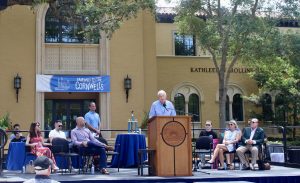
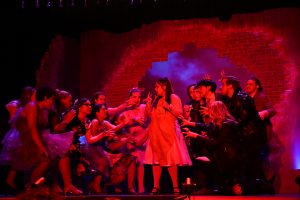
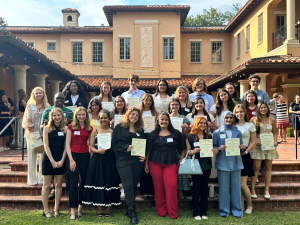
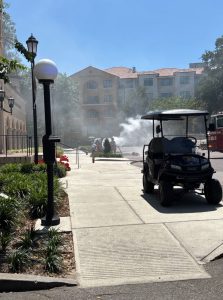
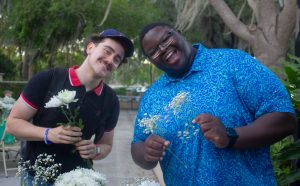

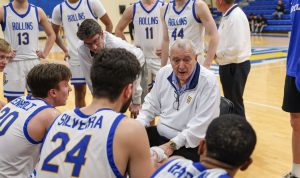
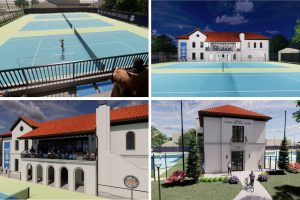



Comments are closed.